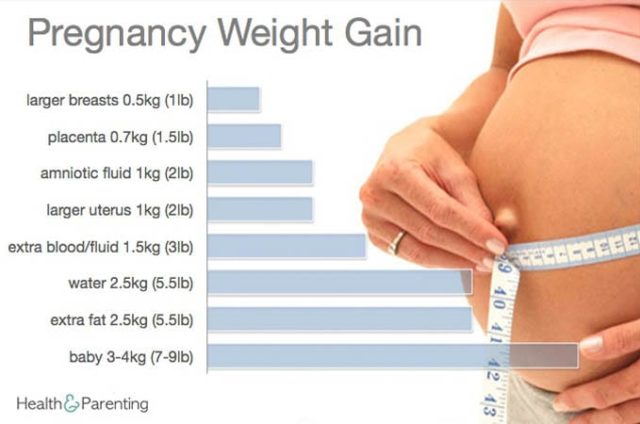The amount of weight you gain throughout pregnancy is very important for the health of your pregnancy and for the long-run health of you and your baby.Eating a healthy, diet can facilitate your baby get the nutrients he or she wants and grow at a healthy rate.Though you do want some further calories, it isn’t necessary to ”eat for 2.” the common pregnant lady desires only concerning 300 healthy calories additional a day than she did before she was pregnant. this can facilitate her gain the proper amount of weight throughout pregnancy.
How Much Weight Should You Gain during Pregnancy?
Ask your health care provider what proportion weight you must gain. Because How much weight you should gain during pregnancy is based on your body mass index (BMI) before pregnancy. BMI is a measure of body fat calculated from weight and height.
You can calculate BMI before became pregnant using this BMI Calculator.
Weight Gain Recommendations for Women Pregnant With One Baby
Weight Gain Recommendations for Women Pregnant With Twins
All recommendations are from the Institute of Medicine, with the exception of underweight women with twins. Source: Luke B, Hediger ML, Nugent C, Newman RB, Mauldin JG, Witter FR, et al. Body mass index-specific weight gains associated with optimal birth weights in twin pregnancies. J Reprod Med. 2003; 48:217–24.
Is It Important to Gain the Recommended Amount of Weight During Pregnancy?
Yes, Because gaining less than the suggested quantity of weight in pregnancy can caused delivering a baby who is simply too little. Some babies born too little could have difficulty beginning breastfeeding, could also be at raised risk for sickness, and will experience developmental delays (not meeting the milestones for his or her age). And also gaining the more than the recommended weight an cause having a baby who is born overlarge, which might cause delivery complications, cesarean delivery, and fatness throughout childhood. Gaining over the suggested quantity of weight may also increase the number of weight you hold on to when pregnancy, which might cause fatness.
Steps You Can Take to Meet Pregnancy Weight Gain Recommendations
- Track your pregnancy weight gain at the beginning and regularly throughout pregnancy and compare your progress to recommended ranges of healthy weight gain.
- Work with your health care provider on your weight gain goals at the beginning and regularly throughout your pregnancy.
- Eat a balanced diet high in whole grains, vegetables, fruits, low fat dairy, and lean protein.
- Limit added sugars and solid fats found in foods like soft drinks, desserts, fried foods, whole milk, and fatty meats.
- Know your calorie needs. In general, the first trimester (or first three months) does not require any extra calories. Typically, women need about 340 additional calories per day during the second trimester (second three months) and about 450 additional calories per day during the third (last) trimester.
- Work up to or maintain at least 150 minutes (2 ⅟2 hours) of moderate intensity aerobic activity (such as brisk walking) per week. 150 minutes may sound overwhelming, but you can achieve your goal by breaking up your physical activity into 10 minutes at a time. Physical activity is healthy and safe for most pregnant women. Talk to your health care provider to determine if you have any physical activity restrictions.
ALSO READ : HOW TO BOND WITH YOUR BABY DURING PREGNANCY
REFERENCE
cdc.gov. 2017. maternalinfanthealth. [ONLINE] Available at: https://www.cdc.gov/reproductivehealth/maternalinfanthealth/pregnancy-weight-gain.htm. [Accessed 9 July 2017].
webmd. 2017. healthy-weight-gain. [ONLINE] Available at: http://www.webmd.com/baby/guide/healthy-weight-gain#1. [Accessed 9 July 2017].










